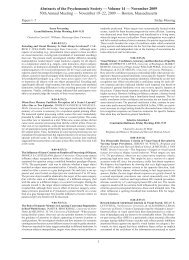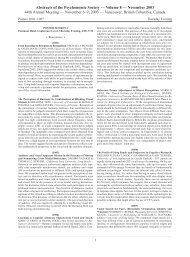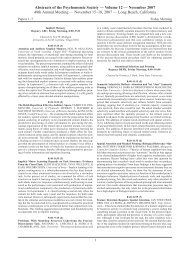Abstracts 2005 - The Psychonomic Society
Abstracts 2005 - The Psychonomic Society
Abstracts 2005 - The Psychonomic Society
You also want an ePaper? Increase the reach of your titles
YUMPU automatically turns print PDFs into web optimized ePapers that Google loves.
Posters 1085–1091 Thursday Evening<br />
how switch costs decrease as preparation time increases in both paradigms.<br />
Differences were found in the nature of switch costs in terms<br />
of their rate, asymptote, and gain parameters. Mixed models of the<br />
nonswitch and switch trial data further highlight the underlying differences<br />
in switch costs between paradigms and lend support to the<br />
notion that an executive control component may play a role in switch<br />
costs for predictable but not for unpredictable task switching.<br />
(1085)<br />
Stimulus-Based Priming of Tasks in Task Switching. IRING KOCH<br />
& WOLFGANG PRINZ, Max Planck Institute for Human Cognitive<br />
and Brain Sciences, & ALAN ALLPORT, University of Oxford—Performance<br />
costs when switching tasks are related to interference. One<br />
determinant of task interference is whether the stimuli have previously<br />
occurred in the context of competing tasks. To explore the role of prior<br />
stimulus–task association in task interference, we used bivalent stimuli<br />
but had subjects practice them with only one of two tasks (“consistent<br />
mapping,” CM), or with both tasks (“varied mapping” of stimuli<br />
to tasks, VM). In alphabet arithmetic tasks, we found greater<br />
performance costs for VM than for CM stimuli. This suggests increased<br />
interference when stimuli are associated with both tasks because<br />
such stimuli prime the competing task. Using numerical judgment<br />
tasks, we had subjects practice only CM stimuli and then, after<br />
practice, reversed the consistent stimulus–task mapping. Mapping reversal<br />
resulted in massive stimulus-priming effects. <strong>The</strong>se stimuluspriming<br />
effects were reduced by cue-based task preparation, suggesting<br />
a precedence of cue–task over stimulus–task associations.<br />
(1086)<br />
Cue-Based Preparation Effects on Switch Costs and the Contents of<br />
Task Set. AGATHA LENARTOWICZ, Princeton University, NICK<br />
YEUNG, Carnegie Mellon University, & JONATHAN D. COHEN,<br />
Princeton University—This study considers both whether cue-based<br />
preparation affects switch costs and the degree to which this process<br />
interacts with task-set contents. Schuch & Koch (2003, JEP:HPP)<br />
have shown that in a no-go paradigm, cue-based preparation preceding<br />
a no-go trial does not affect switch costs, thus suggesting that task<br />
execution is the primary contributor to switch costs. In this study, we<br />
found that both the inclusion of active no-go trials and the nature of<br />
the task sets switched between can affect cue-based preparation. We<br />
tested participants using two variants of a task-switching paradigm:<br />
varying the no-go trials from active to passive, and varying the task<br />
sets from number judgments (i.e., odd/even, greater/less than 5) to semantic<br />
judgments (i.e., living/nonliving, large/small). Passive no-go<br />
trials and semantic judgments resulted in larger switch costs relative<br />
to active no-go trials and number judgments. We show that cue-based<br />
preparation without task execution can affect the magnitude of switch<br />
costs.<br />
(1087)<br />
Shift Costs and Benefits Following Errors and Error Corrections.<br />
MARCO STEINHAUSER & RONALD HÜBNER, University of<br />
Konstanz—When participants alternate randomly between two tasks,<br />
performance is impaired in task shift trials relative to task repetition<br />
trials. We hypothesized that a portion of this shift cost is caused by<br />
the strengthening of task-related associations that took place on the<br />
previous trial when the response was produced. <strong>The</strong>refore, shift effects<br />
following errors and error corrections were investigated in a series<br />
of three experiments, in which a task-shifting paradigm with a<br />
deadline procedure was applied. As predicted by our strengthening account,<br />
shift benefits instead of shift costs were observed following a<br />
specific type of error (Experiment 1). <strong>The</strong> same pattern of results occurred<br />
when participants explicitly indicated the detection of an error<br />
(Experiment 2). In contrast, shift costs were observed when the errors<br />
were corrected (Experiment 3). It was concluded that the shift effects<br />
in task-shifting are due to the strengthening of associations contingent<br />
to the production of an overt response.<br />
64<br />
(1088)<br />
Alternating Between Verbal and Spatial Memory Tasks: Costs and<br />
Benefits. CINDY CHAMBERLAND & KATHERINE GUÉRARD,<br />
Université Laval, FABRICE B. PARMENTIER, University of Plymouth,<br />
ROBERT ROUSSEAU, Defence R&D Canada, & SÉBASTIEN TREM-<br />
BLAY, Université Laval (sponsored by Robert Rousseau)—<strong>The</strong>re is<br />
ample evidence for a performance cost in alternating between tasks<br />
(e.g., Rogers & Monsell, 1995). Most of the research has so far focused<br />
on the impact of switching task set between identification tasks<br />
that share the same source of information and require no memory<br />
load. In the present study, we examined whether the task switch cost<br />
also applies by alternating between verbal and spatial memory tasks.<br />
<strong>The</strong> procedure required the reproduction of a sequence of stimuli: letters<br />
for the verbal serial recall task and spatially distributed dots for<br />
the spatial serial recall task. A recall performance cost was observed<br />
in the spatial task, but a benefit emerged in the verbal task. This asymmetric<br />
pattern is modulated by the memory set size and the number<br />
of alternations. Our findings are informative with regard to the relative<br />
contributions of interference and reconfiguration to performance.<br />
(1089)<br />
<strong>The</strong> Effect of the Cue-to-Stimulus Interval on Transferable Improvement<br />
in Task Switching. MEREDITH E. MINEAR, Washington<br />
University, & PRITI SHAH, University of Michigan, Ann Arbor—<br />
Earlier work has demonstrated that task-switching performance can<br />
improve with practice (Kray & Lindenberger, 2000) and that this improvement<br />
can transfer to a new switching context (Minear et al.,<br />
2002). In this experiment, we examined the extent to which the<br />
amount of time given to prepare for a switch affects the training and<br />
transfer benefits seen. We manipulated the cue-to-stimulus interval<br />
(200 vs. 600 msec) used during training and transfer. With a short interval<br />
(200 msec), individuals who received practice on switching<br />
showed transferable improvement in comparison with a control group.<br />
However, with a long interval (600 msec), in which preparation is hypothesized<br />
to be complete, individuals who received switching practice<br />
did not differ from a control group on a transfer task. This suggests<br />
that transferable improvements seen after practice on switching<br />
tasks relate to the preparatory component of switching but do not affect<br />
the residual switch costs seen after preparation is complete.<br />
(1090)<br />
Effects of Bilingualism and Task Switching on Hemispheric Interaction.<br />
SUZANNE E. WELCOME & CHRISTINE CHIARELLO, University<br />
of California, Riverside—People perform complex tasks more<br />
efficiently when relevant information is presented to separate hemispheres<br />
(the across-hemisphere advantage). In this study, we investigated<br />
whether variation in bilingual language experience affects control of<br />
hemispheric interaction. Monolinguals, bilinguals who frequently interact<br />
with other bilinguals, and bilinguals who primarily interact with<br />
monolinguals performed two divided visual field tasks. Participants<br />
received a less complex digit-matching task and a more complex addition<br />
task with matching items shown in the same or opposite visual<br />
fields. On half of the trials, the task was the same as the previous trial,<br />
and on half the task switched across trials. <strong>The</strong>re were no language<br />
group differences in task-switching cost. However, language group<br />
moderated the effect of task complexity on the across-hemisphere advantage.<br />
Bilingualism may alter how processing is coordinated across<br />
hemispheres.<br />
(1091)<br />
Sequential Dependencies in a Task-Switching Paradigm. ANDREW<br />
P. HANLIN, SUSAN LAGRONE, & DANIEL H. SPIELER, Georgia<br />
Institute of Technology—Traditional response time (RT) experiments<br />
are interested primarily in variation in RT due to experimental manipulations.<br />
Residual variability in RT is often treated as random<br />
“noise.” Recent evidence has been presented that there are sequential<br />
patterns in RTs over the course of an experimental session (Gilden,





